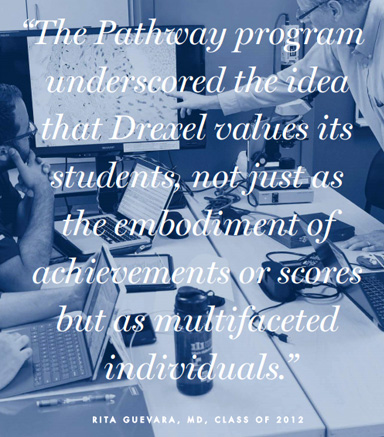Inspiring the Best
Rita Guevara, MD, Class of 2012, entered Drexel through the Pathway to Medical School program. She already knew she wanted to work with children and that she wanted to practice in an urban hospital setting with an underserved patient population. During her pediatrics rotation at St. Christopher's Hospital for Children, she found the niche she was looking for. Today, as one of two Latina providers in her general pediatrics practice, Dr. Guevara helps to break down language barriers for her patients while providing them with the highest level of care, and she trains Drexel medical students to do the same.
FINDING A NEED
I came to the United States from Peru as a child, and my family was undocumented for many years. There were often situations where I found myself helping my mother or aunt translate letters, or I had to make a call on their behalf because of their limited English. Fortunately, I never had to translate for my family during medical appointments, but I understood that at that time it was a common occurrence for many families, and that language was a fundamental barrier to patient health. I knew this was something I wanted to address.
THE FOUNDATION FOR EXCELLENCE
After college, I worked at a nonprofit in Baltimore and did a one-year program at Johns Hopkins Bloomberg School of Public Health, which gave me more perspective on health challenges in the Latino community in Baltimore and a better sense of how I might shape my career. The Drexel Pathway to Medical School program was a great opportunity for me because I was not a traditional applicant to medical school, and it gives students like me a chance to find equal footing. During that year, I honed my study techniques, learned to manage time and stress, and gained other critical skills that helped me excel academically. It also underscored the idea that Drexel values its students — not just as the embodiment of achievements or scores but as multifaceted individuals in a diverse community. I developed lifelong relationships with colleagues who are now making amazing contributions all around the country.
THE BEST CARE FOR THE LITTLEST PATIENTS
I have always loved working with children, and I see pediatrics as the way to care for people during a time in their lives when I can have a greater impact. During my third year at Drexel, I did a rotation at St. Christopher's Hospital for Children and had the chance to work with a diverse patient population, most of whom were facing socioeconomic stressors and psychosocial risk factors that affect their health. It only solidified my interest in pediatrics and my drive to help bridge gaps in health care for patients.

SEEING THE BIGGER PICTURE
At Drexel, I was also lucky to work with the Women's Health Education Program, where I saw firsthand how women's and children's health overlap. It's a great example of what Drexel does best: ensuring that patients are treated equally and given access to the best care. You see this quality in the medical students, too. They have contributed so much to the school, either through leadership councils or student activities — many of them are also skilled in music or the arts, or pursue a public health interest, or are focused on addressing health care disparities in the LGBTQ community and other underserved groups. I continue to be impressed as I work with Drexel students who rotate through my clinic. What stands out is the fact that they understand that health care is not just about the disease or the pathophysiology — it's about who your patients are as people and the challenges they face every day. Drexel teaches us to be culturally humble in our approach, and that makes a difference.
A CONTINUING JOURNEY
Medical excellence is about perpetually learning and improving what you do. There is always a way to better yourself as a clinician and strive for the best-quality treatment for patients. In my current job that means addressing their circumstances, minimizing stress and promoting resiliency. To me, it's very important that I never sit back and think I'm done or that I've learned everything I need to know. One of the best parts of medicine is the lifelong learning.
Back to Top